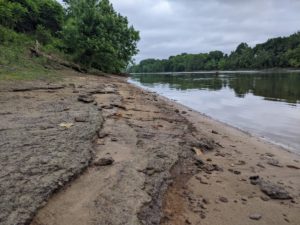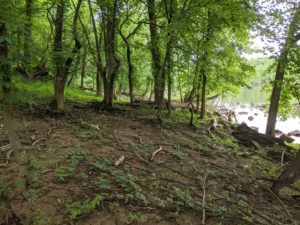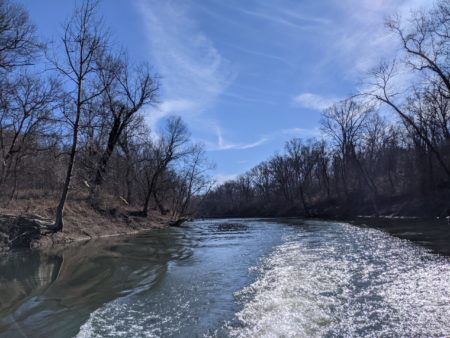Our Environment and the Humanities: Hill’s Island
In 2021, TennGreen Land Conservancy gifted Hill’s Island to the Cumberland River Compact (The Compact) to steward this 20-acre parcel of land, located in The Compact’s namesake watershed. From the beginning, The Compact made the commitment to focus not only on environmental research and education opportunities that would engage the public, but also to delve into the cultural history of the island.
“We saw that historic and humanities-focused conversations were very popular with our audiences through our River Talks program, and we were able to engage new people in a new way,” said Catherine Price, Senior Program Manage with The Compact.
When the SHARP grant opportunity presented itself in 2021, Price and the team at The Compact saw this as a natural fit to give them more capacity to explore the history of Hill’s Island. “The SHARP grant allowed us to have these important conversations about this parcel of land; not just the environmental aspect but the history.”

Hill’s Island was known for its recreational use in recent years. But what about its use in the 1800s as a holding place for the inter-state slave trade? And how was it relevant to Native American removal and the Trail of Tears? This history is not wholly documented. The Compact’s SHARP project funding helped launch the first step to gain a better interpretive history of the island. This included collaborating with the Tennessee State Museum and Dr. Learotha Williams, Jr., a scholar of African American, Civil War and Reconstruction, and Public History at Tennessee State University.
“This idea that humanities are everywhere is so true, especially as we look at the environment. We can’t separate the lands that we steward from the history and the ways people have interacted with those lands,” Price added.
This fall, The Compact will launch phase one of the Hill’s Island project, including a multi-media site featuring a timeline and history of the island. Content was curated through field trips to the island with Dr. Williams, historians and archeologists and includes video and audio history clips. In the future, The Compact will host public conversations with Dr. Williams.
“SHARP was open to non-humanities organizations like us, and I think it will shape how we think about other lands that we steward in a new way moving forward,” according to Price.

Learn More & Follow the Hill’s Island Project:
The organizations and programs highlighted in this ongoing series received grant funding through SHARP – Sustaining the Humanities through the American Rescue Plan – which provided nearly $1 million to 91 Tennessee organizations to support their recovery from the pandemic.



